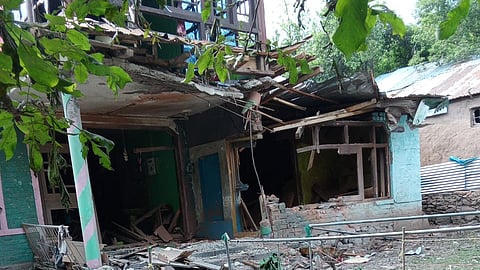

Four months ago, Naseem Khan and his brother Zubair, residents of Uri, purchased 35 expensive Beetal goats from Bathinda in Punjab and Hanumangarh in Rajasthan helped by a bank loan of Rs 9 lakh. The brothers, who work as labourers, had started earning a good income by selling goat milk. To manage their household more effectively, they decided that one of them would focus full-time on the milk business.
However, their dreams were shattered on May 7 when shelling from across the border destroyed their home. The nearby barn was also hit, killing all the goats. The shelling came in response to Operation Sindoor, a counter-terrorism offensive launched by India on the same day targeting terrorist camps in Pakistan and Pakistan-occupied Kashmir.
“The shelling started at 2am,” recalled Naseem. “When we realised the shells were hitting our neighbourhood, we went to the bunker for safety,” he said.
Naseem’s joint family has 32 members, including 11 children.
Not everyone managed to escape. Naseem’s young niece and his father, Hamed Khan, remained trapped in the house, taking cover beneath a staircase. Amid the ongoing shelling, one of Naseem’s brothers braved the danger and rushed back to rescue them, only to find both unconscious. Hamed had sustained injuries to his back and leg, while the little girl was discovered under the rubble, suffering from a concussion. “When one of the shells hit the side of the house, the wall collapsed inward and knocked her out,” Naseem explained.
Around 7am, when the shelling finally ceased, an ambulance arrived to transport the injured to the hospital. Concerned neighbours had called for help after witnessing shells strike the Khan residence. The entire family left with the ambulance.
The family lives in Ramgai village which is 15 km away from the Indo-Pak border. The 80-120mm artillery shells fired from the other side of the border cover a range of 30-40 km. Hence, Naseem's village along with many other villages in the bordering district of Baramulla bore the brunt of the retaliation.
A week later, Naseem and his brother returned to assess the damage. The sight of their shattered home moved them to tears. “I don’t want to live here anymore. There’s fear everywhere,” he said. “When you grow up in a house from childhood, it carries all your dreams. Now, it’s all gone.”
For the past week, the Khan family has been living with friends and relatives in Baramulla town. Naseem’s father and niece are still in the hospital but their condition is stable now. When asked why they did not go to the camps set up by the government, he said, “Children won’t be able to stay. At home, there are 30 people together. But there, it would be in the hundreds.”
The shelling left the children traumatised. “If we shut the door or the window, or there is strong wind blowing, they would start screaming. If there is any noise outside, they will start screaming. One of the kids had to be taken to the hospital that very morning for his trauma. He was non-responsive, frozen with an expression of horror on his face. Even we (adults) are scared. Still we are thankful that we are alive, that’s the big thing,” he said.
It truly was a lucky escape considering Naseem’s family was hit by at least 11 Pakistani shells that night.
According to the latest media reports, at least 20 people were killed in the bordering villages by Pakistani shelling during the period of escalation post-Operation Sindoor. However, the government has not issued any official statement on casualties and livelihood losses.
A portion of Naseem’s house was obliterated, reduced to dust and debris that blanketed everything. The kitchen floor was covered in huge chunks of wood and concrete. All the windows were shattered, and all the fabrics left in tatters. There was no object in the house not riddled by splinters from the shells.
Holding an angular piece of wood, he said it was the main door of the house; a metallic box of junk was the family fridge; a shredded piece of black leather was his daughter’s school shoes. Holes also dotted the children’s school uniforms. “Now we have to buy these things again,” he said.
His family in Baramulla is unaware of how bad the conditions are back home. The two brothers have not told them yet. “Some of them have heart ailments,” said Naseem.
But both the brothers have to rebuild the house quickly. “How long can friends and relatives keep us?”
But how will he manage? “We built the house with our wages. Now, we don’t have a house nor wages. I don’t know what to say anymore, I feel I will tear up,” Naseem said.
Naseem’s family and hundreds of others hit hard by the shelling now pin their hopes on government support. The Centre, Jammu and Kashmir government and Punjab government have announced compensation for the families of the deceased, but not for those who lost their houses and livelihoods.
But Naseem remains optimistic. “We trust the government. Hope it will do something for us soon,” he said.